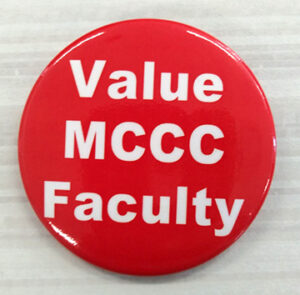
You may have seen red buttons appearing on the shirts of faculty members around campus, each one stating “Value MCCC Faculty.”
These buttons are part of an effort by staff members to bring awareness to the ongoing negotiations between faculty and the college administration. Negotiations that are not going smoothly.
“Slow moving” is how Linda Torbet, director of Human Resources and chief negotiator for the college, described the process.
“There’s a lot of different things on the table that weren’t on the table before,” Torbet said.
The contract, which is called the Master Agreement, includes 17 articles and five appendices, all of which need to be negotiated.
“You have your usual, your wages, benefits, general working conditions,” Mark Bergmooser, president of the MCCC faculty association, explained when asked about what areas of the contract are facing the most contention.
The most recent Master Agreement, negotiated in 2019 and expired on Aug. 22 of this year, is still in effect while the current negotiations are ongoing. This day-by-day extension freezes any scheduled pay raises that faculty were set to receive at the beginning of the academic year until an agreement is reached, which is something that does not seem likely to happen any time soon.
“It is very difficult to reach agreement on any of the proposals that are in front of us,” Bergmooser said, “there does not appear to be a willingness to settle this.”
In fact, if things continue on the current course, these negotiations are headed toward mediation, a process in which a neutral third party, typically a lawyer, will actively work with both sides to reach an agreement.
Mediation is nothing new for MCCC during negotiations. In 2016, negotiations went badly enough to spur faculty into protesting on campus, holding signs and even marching through the annual welcome back barbecue that year. And it is not out of the question that students will see that kind of action during these negotiations.
Jenna Bazzell, associate professor of English at MCCC, is part of the crisis action teams at the college, and she said that students can expect to see picketing and flyers (along with the buttons) to help raise awareness of the ongoing negotiations among the student population.
“I encourage students to educate themselves,” Bazzell said, “go up to faculty and ask questions.”
Bazzell wanted to emphasize the importance of these negotiations and the impact their outcome may have on students by stating, “faculty working conditions are student learning conditions.”
Torbet agrees that student conditions are an important issue saying, “our lens is through the student.”
Torbet, who is negotiating her first full contract at MCCC after joining the administration during the tail-end of the 2019 negotiations, still remains optimistic about reaching an agreement with faculty and resolving some of the articles before the mediation process begins.
“We have some work we can complete before bringing in a mediator,” Torbet said, “We’ve only tentatively agreed to two articles and we’re talking about maybe 12 plus appendices.”
Until MCCC faculty and administration hammer out this contract, through mediation or otherwise, students should get used to seeing some changes on campus. Maybe ask your professor about their button next time you see them, you might learn something.

